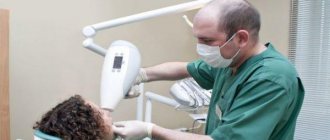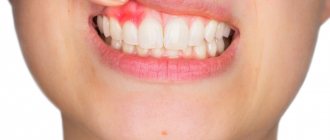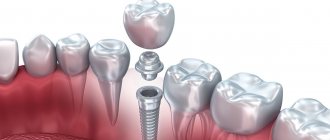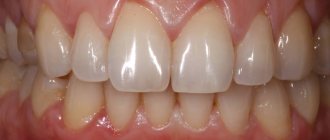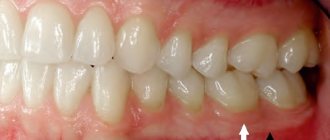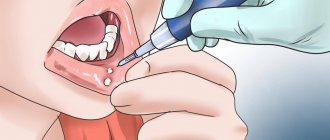Inflammation of the oral mucosa is observed in 70% of pregnant women. This disease is diagnosed as gingivitis and occurs for several reasons, one of which is hormonal changes in the body. During pregnancy, there is an active production of hormones such as gonadotropin, progesterone, and somatomammotropin. These hormones cause significant changes in the systems of the female body, in particular in the gums.
During the period of fetal formation, the expectant mother experiences a disturbance in the blood supply to the tissues. For the skin, this is fraught with the appearance of acne and stretch marks in certain areas of the skin, and the mucous tissue of the gums can be subject to chronic inflammatory processes to varying degrees during pregnancy. At the same time, the gum tissue becomes vulnerable and is easily subject to mechanical and chemical irritation.
The second factor that provokes gingivitis is considered to be insufficiently thorough hygiene of the gum tissue. Bacteria living in dental plaque begin to actively multiply. They settle in periodontal pockets and cause pathological processes in soft tissues. It must be taken into account that pregnant women tend not to deny themselves nutrition and all kinds of delicacies. A large amount of sweet and carbohydrate foods is also a factor in the growth of pathogenic microflora and the occurrence of gum gingivitis. An imbalance in the acid balance in the tissues of the oral cavity promotes the active growth of pathogenic bacteria: they form more and more plaque in the gums.
When carrying a child, the expectant mother should pay special attention to the condition of the gum tissue. And if there is a need to visit a doctor, if there is a suspicion of gingivitis, then we hasten to inform you that the safest and most favorable period for visiting a dentist is 13-24 weeks of pregnancy.
It is important for women in an interesting position to remember that their body and the body of the unborn baby are a single whole, and therefore, with gingivitis, bacteria from the mother’s mouth can easily penetrate into the child’s body, and therefore the work of the baby’s immune system may receive additional stress.
The first symptoms of incipient gingivitis may be:
- painful sensations in the gums when chewing rough food;
- reaction of soft tissues to cold and hot;
- bleeding in the area of the gingival papillae;
- swelling of tissues in the area of periodontal pockets;
- increased plaque with an intense yellowish tint;
- the appearance of an unpleasant odor in the mouth.
Why do teeth and gums hurt during pregnancy?
During pregnancy, gum disease worsens, so when brushing you may see blood on your toothbrush. This occurs due to inflammation of the tissues in the oral cavity. To save your teeth, you need to identify the problem and begin treatment.
Increased levels of estrogen and progesterone in the body contribute to inflammation of the gums and increase their sensitivity. This condition is called pregnancy gingivitis, and it develops in 50% of all pregnant women.
Another problem associated with pregnancy is that some women develop tumors on the gums known as pyogenic granulomas. This is an immune response to an irritant, in this case plaque. Granulomas usually disappear after childbirth.
Why does gingivitis occur during pregnancy?
Tens of millions of microorganisms live in the oral cavity. Slight swelling of the gums leads to an increase in periodontal pockets, which become an excellent reservoir for the life and reproduction of bacterial microflora. In addition, microorganisms do not lack nutrition, since pregnant women like to pamper themselves with sweets, and carbohydrate foods are the best substrate for the development of bacteria.
Swelling of the gums, leading to an increase in periodontal pockets, excessive salivation, an acidic environment in the mouth, an increased feeling of hunger - these features that accompany pregnancy are the main factors contributing to the rapid growth of oral microflora. And this, in turn, provokes inflammation of the gum tissue - gingivitis.
How can oral health affect a child?
Recent research shows that severe gum disease, accompanied by red, swollen or bleeding gums, can harm the health of an unborn baby.
Scientists have found that women with severe gum disease are 7 times more likely to have preterm birth before 32 weeks than women with healthy gums. Another study looked at women with gingivitis and more severe gum disease and found a threefold increase in the risk of giving birth before 37 weeks.
Current research into gum disease during pregnancy shows a risk of prematurity comparable to that of alcohol consumption and slightly higher than that of smoking. Premature babies may have a wider range of health problems immediately after birth than full-term babies.
Women with gingivitis may also have low birth weight babies during pregnancy. Studies have shown that if you have gingivitis during pregnancy, you are 3 times more likely to have a low birth weight baby. This estimate is comparable to the risk associated with smoking during this period.
Features of treatment
Treatment of gingivitis consists of three stages:
- cleaning the oral cavity;
- anti-inflammatory measures;
- prevention of re-development of the disease.
The duration of therapy depends on many factors, among which the stage of pregnancy at which the patient is and her individual characteristics are especially important. The specialist also takes into account the nature of the disease and the degree of its progress. We recommend that you carefully monitor your oral hygiene and diet before and during pregnancy, and if you notice signs of gingivitis, immediately seek qualified medical help. Experienced doctors will examine you and determine the most effective treatment strategy.
What to do if you are diagnosed with gum disease?
During pregnancy, professional teeth cleaning is required once.
If there are serious gum problems, then root scaling is a form of deep cleaning that is recommended when pocket plaque around the teeth exceeds 3mm. By scraping or removing plaque at and below the gum line, the base of the tooth is aligned or smoothed, and less plaque builds up.
Women with gum disease whose teeth were cleaned with this method had six times lower rates of preterm birth (in this case before 35 weeks) than women who received only professional cleanings.
The second trimester is a good time to schedule a routine dental visit. But if a woman is at risk of miscarriage or other problems, then it is better to postpone the dental examination.
During dental treatment, X-rays are often prescribed in order to analyze the condition of the tooth, but during pregnancy, X-rays are contraindicated because they affect the development of the fetus and can lead to irreversible consequences.
To avoid such an examination, you need to go to the dentist in preparation for pregnancy. The doctor will identify existing pathologies and treat them before conception.
How does inflammation manifest?
How to recognize the presence of an inflammatory process? It’s simple, the following factors begin to cause discomfort to a woman:
- The gums become swollen and acquire a bright red tint.
- Pain occurs on palpation or when eating.
- Acute reaction to cold and hot.
- Possible increase in body temperature.
- If left untreated, pus may appear in the space between the tooth and gum.
In order not to trigger the pathology and provoke more serious complications, we strongly recommend solving the problem in a timely manner.
How to relieve toothache in pregnant women
If a toothache occurs, a pregnant woman should immediately contact her dentist to find out the causes and take timely treatment measures. But it happens that pain appears at night, during a trip, or under other circumstances when it is not possible to visit a doctor. In this case, the woman should call her dentist, make an appointment and explain her condition. Your doctor will recommend what you can do to relieve your pain before visiting the clinic.
To relieve toothache, a pregnant woman can do the following:
- Rinse your mouth with warm water to remove any remaining food. You need to brush your teeth using a toothbrush and floss (dental floss). If the pain is caused by food getting into the cavity, this may be enough to provide relief.
- Periodically rinse your mouth with warm infusions and decoctions of medicinal plants: calendula, sage, chamomile, eucalyptus. You can also use a saline solution for this purpose (a teaspoon of table salt is dissolved in a glass of warm boiled water). Rinsing does not anesthetize, but has an antiseptic and anti-inflammatory effect, which may reduce pain.
- Take a paracetamol tablet. Panadol, Efferalgan, Paralen, Rapidol are the trade names of paracetamol. It is approved for use at any stage of pregnancy, but the dosage specified in the instructions must not be exceeded. Paracetamol is effective for headaches, moderate dental and joint pain; in acute conditions, it will only reduce the severity of pain.
- Take an ibuprofen tablet (trade names: Nurofen, Ibuprom, MIG 400, Ivalgin Rapid, Imet). The use of the drug is permitted in the 1st and 2nd trimesters of pregnancy, that is, until the 26th week, and is prohibited in the 3rd trimester. Ibuprofen should be taken with caution and only in critical situations, strictly following the dosage regimen.
- Apply Dentol 10% gel to the gums and into the cavity of the diseased tooth. The drug contains the anesthetic benzocaine, its effect after application to the diseased tooth begins within a minute. Dentol can be applied up to 4 times a day.
- During sleep or rest, take a “reclining” position so that the head is elevated: the pain is slightly reduced, as the blood flow to the periodontal tissues decreases.
Prohibited:
- Take combination medications containing ibuprofen or paracetamol. In addition to these substances, combination medications may contain components that are dangerous to the fetus.
- Warm the diseased tooth, as this threatens the spread of purulent inflammation (if any) to the tissues adjacent to the tooth.
- Take any other medications without permission from your dentist or obstetrician-gynecologist. Many drugs have a teratogenic effect - the ability to disrupt the embryonic development of a child.
Prices for gingivitis treatment and periodontal treatment
| Treatment in the area of the upper and lower dentition using the Vector device | 19900 16900₽ |
| Removal of supragingival and subgingival dental plaque in the area of 1 tooth manually | 900 ₽ |
| Manual removal of subgingival dental plaque in the area of 1 tooth | 600 ₽ |
| Flap surgery | from 6500 ₽ |
| Splinting of teeth and restoration in the area of 2 teeth with fiber material "GlasSpan" | 4700 ₽ |
| Treatment of gums in the area of 1 tooth using the “Vector” device | 1100 ₽ |
| Treatment of gums, periodontal pockets of the 1st jaw with the “Vector” device | 9900 ₽ |
| Lip frenulum correction surgery | 4660 ₽ |
| Vestibuloplasty | from 4950 ₽ |
| Tongue frenulum correction | 1500 ₽ |
The danger of toothache
Expectant mothers, fearing the negative effects of medications on the baby’s body, endure toothache. They do not take medications to relieve it and do not go to see a doctor because they are afraid of the dentist using anesthesia. There is also an opinion that dental treatment is dangerous for pregnant women; it is better to wait and treat teeth after childbirth.
These judgments are erroneous; if a woman suffers toothache, she can cause enormous harm not only to her body, but also to her unborn baby. What are the dangers of toothache?
- Acute toothache due to pulpitis or periodontitis indicates the presence of purulent inflammation, which can spread to the periodontal tissues or enter other organs through the bloodstream. Odontogenic periostitis, peri-maxillary phlegmon, sepsis are conditions that can threaten the life of mother and child.
- The addition of even a minor purulent infection requires the prescription of antibacterial drugs, which also harm the unborn baby.
- After childbirth, postpartum sepsis may develop, the cause of which is a sore tooth.
- Teeth deteriorate quickly during pregnancy, so if you endure the pain and do not see a doctor in time, the question of tooth extraction may arise. Carrying out this operation increases the risk of infection entering the body through the hole; Also, removal is unnecessary stress for the patient.
- Constant pain weakens the nervous system of a pregnant woman and affects the intrauterine development of the child: the likelihood that the baby will develop abnormalities in the functioning of the cardiovascular, nervous, and endocrine systems increases. Painful stress can cause premature birth.
- If the cause of toothache is non-dental diseases, failure to see a doctor can lead to unpredictable consequences for the body.
Experts' opinion
As a result of clinical experiments using the Asepta series of products, conducted at the Kazan State Medical Academy, the complex use of anti-inflammatory drugs from the Asepta line contributed to faster relief of inflammation, the combined use of balm, gel, rinse, toothpaste and vitamin-mineral complex mutually enhanced the therapeutic effect did not require daily visits to the dentist.
Sources:
- The use of drugs from the Asepta line in the complex treatment of inflammatory periodontal diseases (N.V. Berezina E.N. Silantyeva S.M. Krivonos, Kazan State Medical Academy. Kazan.) N.V. BEREZINA, E.N. SILANTIEVA, S.M. KRIVONOS Kazan State Medical Academy
- https://cyberleninka.ru/article/n/sovremennye-lechebno-profilakticheskie-sredstva-dlya-individualnoy-gigieny-polosti-rta Silantieva E.N., Berezina N.V., Krivonos S.M. Complex treatment of chronic recurrent aphthous stomatitis using drugs from the Asept line, Practical Medicine journal
- Clinical studies of antisensitive toothpaste “Asepta Sensitive” (A.A. Leontyev, O.V. Kalinina, S.B. Ulitovsky) A.A. LEONTIEV, dentist O.V. KALININA, dentist S.B. ULITOVSKY, Doctor of Medical Sciences, Prof. Department of Therapeutic Dentistry, St. Petersburg State Medical University named after. acad. I.P. Pavlova


